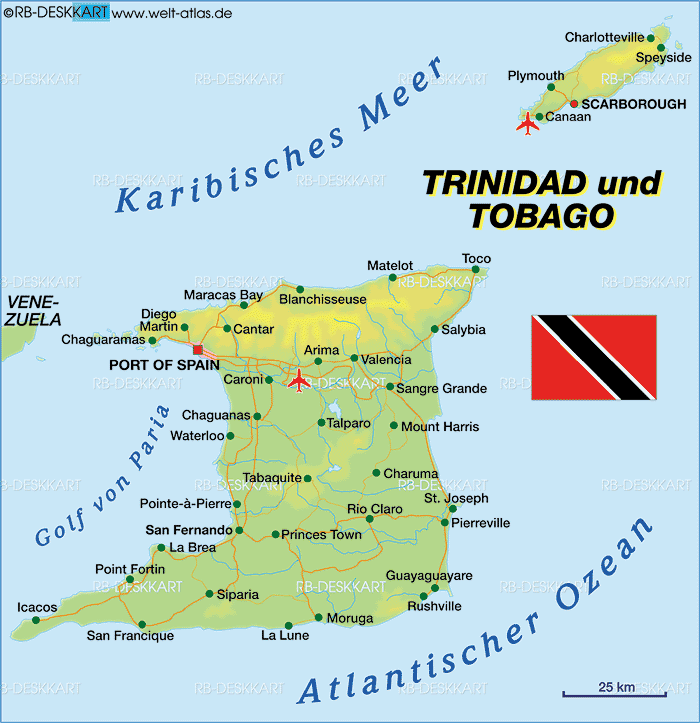

So, as President Obama, Secretary of State Clinton, UN Secretary General Ban and the rest of the hemisphere’s leaders get ready for this year’s Summit of the Americas, more than a few staffers, diplomats and journalists will be pulling out their atlases. One thing I’m sure they’ll find in Trinidad is warm hospitality and, if they step away from the formal events, a good lime (more on that later). But, they will also find a small country facing many of the difficult issues that the Obama administration is currently trying to tackle.
Winning the Summit was a major coup for T&T, and the government has been preparing to host it for several years, using its oil and natural gas income to pay for the construction of hotels, conference buildings, and government ministries. In the grand tradition of papering over problems, it has also found a few T&T dollars to build a wall along the highway from the airport to downtown Port of Spain to hide one of the city’s worst slums (in fairness, this “safety wall” has apparently been in the works for several years, and its stated purpose is to prevent residents from entering this dangerous stretch of roadway on foot). While T&T has had a strong economy the last several years due to its energy wealth, the social and economic gap between rich and poor has only widened, thus the need to hide this poverty from President Obama and the rest of the heads of state.
With the world economy front and center, T&T presents an interesting case study. How will a small country with an economy that is almost entirely dependent on oil and natural gas cope with diminishing demands for its products? Will T&T see a diversification of its economy as a necessity, or will it try to ride the recession out and hope that the demand and price for oil and gas rise again? T&T has used the latter tactic in previous downturns, but, this time, the country, like all of us, needs to recognize that, between the economy and the climate, there is a green wave coming and it is time to ride it. With plenty of sun, wind, and a reasonable amount of land that already produces sugar cane, T&T could get a quick start on job-creating renewable energy projects if it so desired. But, like in the US, it will take strong political will to push a green agenda forward.
On the climate front, one would hope that there would be heightened focus on this issue given Secretary General Ban’s presence and this year’s UNFCCC negotiations that culminate in Copenhagen in December. Even though the actual negotiations are taking place elsewhere, the Summit presents a great opportunity to explore areas of agreement and for an exchange of views between the world’s largest emitter of greenhouse gas, the U.S., and the many island nations of the Caribbean that are among the most severely impacted by the globe’s shifting climate. There is a growing recognition that not only is U.S. leadership absolutely crucial to get a deal in Copenhagen, but that effective island state inputs to the negotiations can have significant influence on the outcome of these critical talks.
T&T is also a reasonable location to consider crime, security, and drug trafficking — always major topics for the Western Hemisphere’s leaders. T&T’s crime rate has spiked in recent years, in part due to an increase in narcotics traffic through the islands — drugs moving from the mainland of South America to Trinidad and Tobago and then up the chain of Caribbean islands to North America (on a clear day Venezuela can be seen from parts of Trinidad). And, of course, drugs bring guns. So, when U.S. diplomats and law enforcement officials meet with their Mexican counterparts to look for ways to squeeze the balloon of drug flow away from the U.S.-Mexico border, President Obama and his team should remember that this will push greater traffic to the “southeastern border” of the U.S. This maritime border is in many ways more problematic given the minimal capacity of security forces in much of the Caribbean and the current lack of trust and cooperation between the U.S. and Venezuela.
When you talk U.S.-Venezuela relations, it is impossible to avoid the 800 pound gorilla of the Summit: Cuba. President Obama has eased restrictions on travel and remittances for individuals with family in Cuba, but, no matter how quickly he and Congress move to further normalize relations with Cuba, it will not be fast enough for the rest of the leaders he will meet in Port of Spain. While Venezuela’s Hugo Chavez is the most vocal of the critics of U.S. policy on Cuba, all of the Caribbean would like to see Cuba brought back into the OAS fold. T&T’s Prime Minister, Patrick Manning, certainly falls into this category, as he is a frequent visitor to Cuba and receives medical treatment there.
T&T will have its big moment on the world stage. And, since “lime” is a Trinidadian catch-all phrase for just about any enjoyable social activity or just hanging out — a cricket match calls for a “cricket lime”, a trip to the beach a “beach lime,” or a chat over a beer with friends on the sidewalk a “pavement lime” — let’s all hope President Obama takes time to find one. Or maybe, just maybe, he, President Chavez, and the rest of the hemisphere’s leaders can make one together and we’ll all be able to say “that was one good Summit lime.”